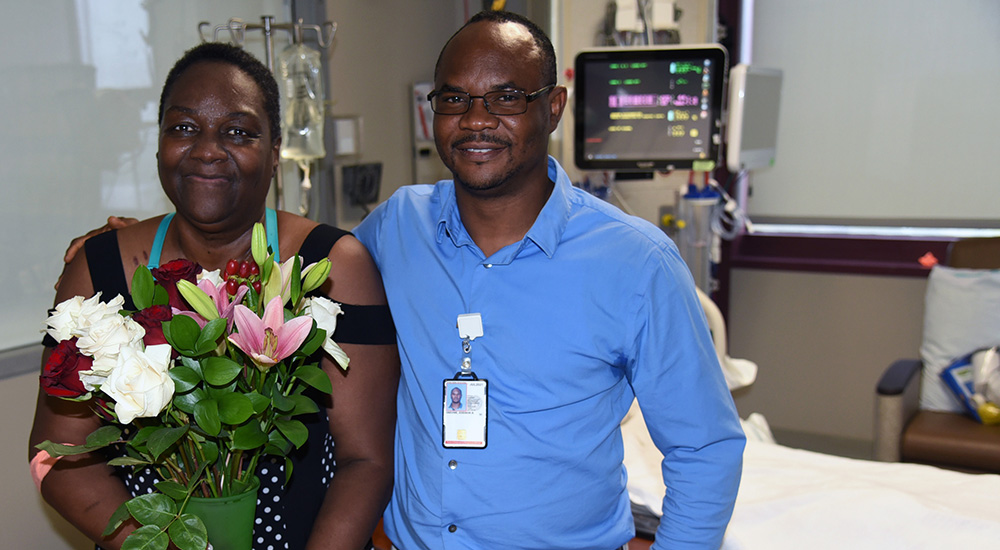Houston VA Medical Center’s Virtual Depression Care Management program is a team of psychiatric nurses who reach out to mental health patients to get a sense of their mood and ensure they are taking their medication.
One such nurse recently came face-to-face with a Veteran whose life he has helped save at least twice.
Army Veteran Debra Lawson credits Ben Osevwe, RN, (pictured above together) with saving her life. He calls her a couple times per month to check in. His last call likely saved her from a heart attack.
“My arteries were completely clogged,” said Lawson. “Every time I walked it was real tight pressure and then pain. I told Ben and he said for me to go to the hospital immediately.”
Lawson was admitted to the Houston VA for a stent procedure to open her arteries. She says it was Osevwe’s caring that made her come in and have the surgery. During her admission, Osevwe brought flowers to her bedside to finally meet the woman behind the voice he knows so well.
“When somebody cares about you, you feel more responsible,” she said. “If something bad happened, I’d hate for him to read about it because he cares so much.”
When depression hit, she answered the nurse’s calls
Over the course of six months, Osevwe and Lawson have developed a connection through their phone conversations. Lawson suffers with bipolar disorder. When depressed, which happens often, she isolates, refusing to leave her bed.
“My room is completely dark,” she said. “It’s like night. And I just want to be left alone when I’m depressed. I try to pick myself up and do things because if I don’t, everything will fall apart. And I’m a compulsive person, too. So, if I do get up and do things I’ll overspend and spend my bill money, which is even worse.”
When depression hits, she won’t take phone calls, but she answers for Osevwe.
“Ben, he is dependable,” she said. “He’s going to call. And when I have called him, he answers the phone. He checks on me regularly. My heart problem didn’t have anything to do with depression and he picked up on that too.”
Because of their many conversations, Osevwe has developed a keen sense for when her depression is worse than usual. During a recent conversation, he told her she didn’t sound well, and Lawson called the Veterans Crisis Line.
“He’ll call me and I’ll try to play it off and tell him, ‘I’m okay,’ but he’ll tell me I don’t sound right and I’ll open up to him,” she said. “The Crisis Line was a big help to me that one night because I just didn’t think I could take it anymore.”
A better understanding of how to help
Admittedly, Lawson doesn’t have many people in her life to whom she can open up. Her depression is so severe that it severs relationships.
“There have been times she has been really depressed and I can sense it in her voice,” said Osevwe. “I try to know a little more about the Veteran and what is going on in their lives so I can have a better understanding of how to help.”
Lawson has five children who care about her, but don’t always know the best way to help her when she’s down.
“That is why we try to involve the family in the treatment,” said Osevwe. “Many times, the family doesn’t have a clue how to help in terms of depression or anxiety. They just don’t know.”
That’s why the Depression Care Management team has been such a welcomed addition. It gives the Veteran another arm of support in a battle that affects so many. For people who are depressed, just having someone to talk with can make all the difference. Osevwe is determined to see her get better. His passion for his job is obvious when he speaks to and about Lawson.
Get rid of things pulling you down
“She doesn’t see a light at the end of the tunnel because she has been going through this for years” he said. “Sometimes there are things in the background that make treatment ineffective. We need to get rid of those things that are pulling you down and then you will respond positively to our treatment. You can be more productive in life.”
The program, which began in April, already has expanded to the community-based outpatient clinics.
“Our job is to give our patients a virtual hug,” said Fran Hodgkins, nurse manager for the program. “We know that if you stay on your medicine, we’ll be able to see your depression decrease.”
That is why Lawson wanted her story told, “So that others may listen to their therapists instead of putting it off and thinking it won’t do any good.”
Before Osevwe went back to work and she finished packing for her discharge, she had one more thing to say.
“I love Ben.”
“I love you, too,” he said.
Todd Goodman is a public affairs specialist with the Houston VA.
Topics in this story
More Stories
The Medical Foster Home program offers Veterans an alternative to nursing homes.
Watch the Under Secretary for Health and a panel of experts discuss VA Health Connect tele-emergency care.
The 2024 National Veteran Suicide Prevention Annual Report provides the foundation for VA’s suicide prevention programs and initiatives.







Hey
Glad to be here. This is actually my first time here and hope to learn more here stuffs here. Have a great week. God bless VA nurse
God bless you VA nurse
This real life event highlights the critical nature of a working therapeutic alliance over time! Clinicians refer this to as “object constancy”. This saves lives. And it reaffirms that nurses are the most respected professional on this planet!
Rich
What a great story on the VA nurse put me to tears
Thanks for sharing